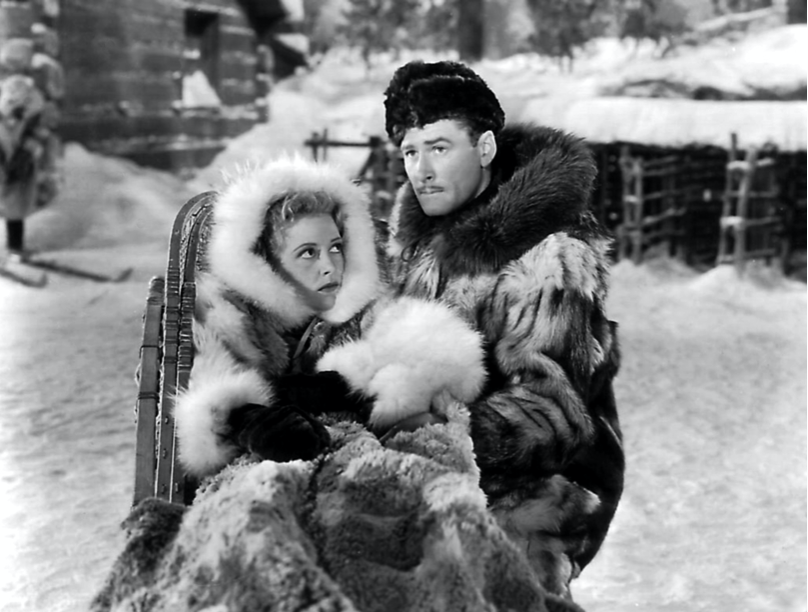While there was plenty of action in the European and Pacific Theatres to keep Axis forces occupied in WWII both in real life and on-screen, it seems the Nazis just couldn’t keep their paws off Hollywood’s version of Canada’s far north (aka “God’s Country”). Even though the stormtroopers depicted in Powell & Pressburger’s 49th Parallel managed to make it clear across the country before finally being stopped at the border, the Third Reich-ers depicted in Warner Brother’s 1943 quickie Northern Pursuit don’t get very far with matinee idol Errol Flynn on their trail.
Like in 49th Parallel, the Nazis here enter Canada via Hudson’s Bay before setting off through the unusually mountainous terrain of Northern Manitoba. After a freak avalanche cuts down all but leader Col Von Keller (Helmut Dantine), the ill-prepared German is rescued by Mounties Jim (John Ridgely) and Steve (Errol Flynn). With the nearest town lying three days journey away, Steve opts to nurse Keller back to health while Jim heads to the fictional town of Bear Lake to report in.
Steve’s German ancestry is seen as a potential asset to Keller and a liability to the force. But when Keller manages to stage a break from the internment camp with several fresh Nazis in tow, Steve volunteers to go undercover and determine the objective of the Nazi’s sinister plot His own mission isn’t made any easier when his out-of-the-loop fiance Laura (Julie Bishop) ends up as Keller’s hostage. As the Nazi’s destructive goal becomes clear, Steve must wage a one man battle to foil their plans and strike a blow for allied victory.
You wouldn’t know to look at it, but Northern Pursuit was quite the trouble-plagued production from the outset. After going through at least four writers including an uncredited William Faulkner, the producers summoned Raoul Walsh from the set of Night Shift to take the reigns. He had to contend with a scandal-ridden star who had just been acquitted of statutory rape and who would later take ill midway through shooting. It turned out he was battling tuberculosis, just one of the many health challenges that kept Flynn out of WWII and would plague him for the remainder of his life.
Despite retaining the services of Hollywood Mountie consultant Bruce Carruthers, the film manages to be riddled with factual errors. From casting Northern Saskatchewan and Manitoba as mountainous “uncharted territory” to a snowbound Winnipeg in August to even referring to John Cabot as an Englishman (he was in fact Italian), the film fits right in with the “God’s Country” image that Hollywood had crafted for Canada during its golden age.
As long as you enter this movie with that in mind, there’s plenty to enjoy in this fast-moving war thriller. Flynn easily commands the screen as a man of action who finds an excellent adversary in the Dantine as the seething Col Keller. The rest of the cast is filled with the usual crop of dependable character faces from that era. The film makes a point of bringing up Steve’s German heritage as a point of contention between him and the force early on and it’s a shame this plot thread is virtually abandoned midway. It’s just the sort of thing that could’ve helped upgrade this B-picture to an A (that and some fact-checking).
Pierre Berton tended to look at this snowbound genre with a fair amount of disdain, but as I continue this series, I find them rather fascinating. For someone who grew up watching (and still continues to see) Canadian cities transformed to American settings, it’s still quite novel to see the reverse happen in a Hollywood production (this picture was largely studio-bound with some location shooting in Idaho) and even more thrilling to see classic Hollywood stars like Flynn, Shirley Temple and Joseph Cotten play Canadians. As Northern pursuit confirms, Golden Age Hollywood may not have had an accurate cinematic identity for Canada, but at least it was one.
6.5/10
![]()
![]()
![]()
![]()
![]()
![]()
![]()
![]()
![]()
![]()

